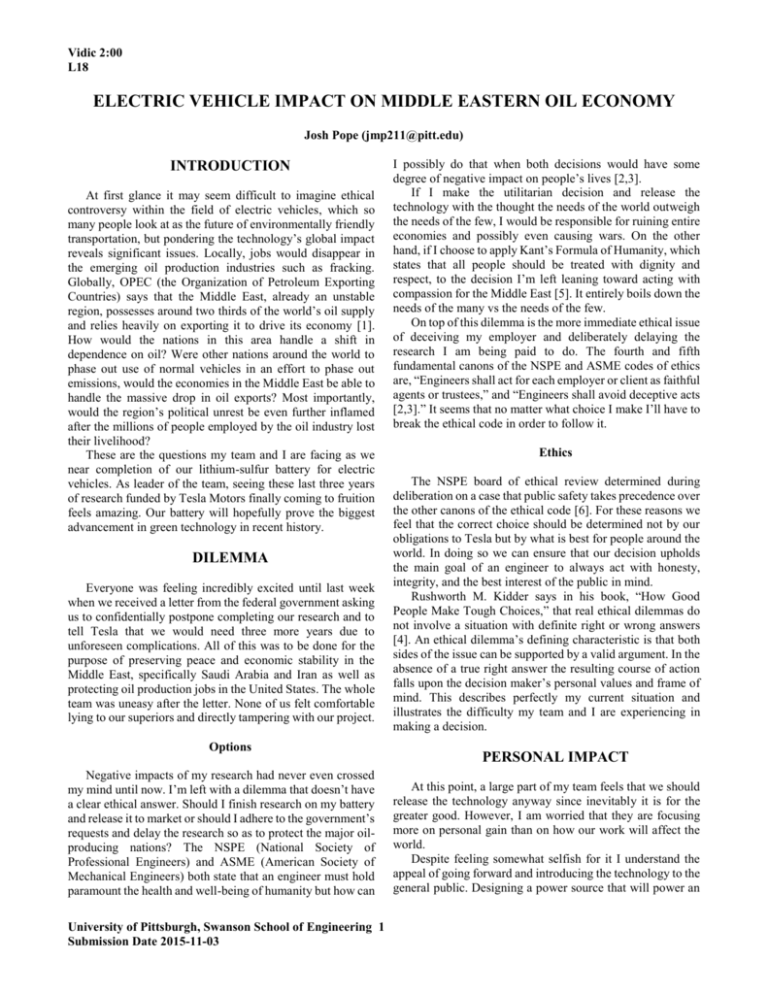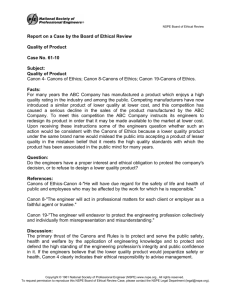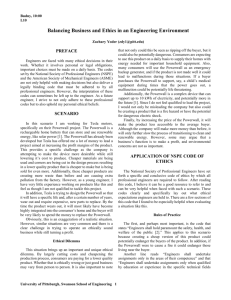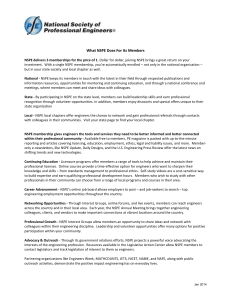here - University of Pittsburgh
advertisement

Vidic 2:00 L18 ELECTRIC VEHICLE IMPACT ON MIDDLE EASTERN OIL ECONOMY Josh Pope (jmp211@pitt.edu) INTRODUCTION At first glance it may seem difficult to imagine ethical controversy within the field of electric vehicles, which so many people look at as the future of environmentally friendly transportation, but pondering the technology’s global impact reveals significant issues. Locally, jobs would disappear in the emerging oil production industries such as fracking. Globally, OPEC (the Organization of Petroleum Exporting Countries) says that the Middle East, already an unstable region, possesses around two thirds of the world’s oil supply and relies heavily on exporting it to drive its economy [1]. How would the nations in this area handle a shift in dependence on oil? Were other nations around the world to phase out use of normal vehicles in an effort to phase out emissions, would the economies in the Middle East be able to handle the massive drop in oil exports? Most importantly, would the region’s political unrest be even further inflamed after the millions of people employed by the oil industry lost their livelihood? These are the questions my team and I are facing as we near completion of our lithium-sulfur battery for electric vehicles. As leader of the team, seeing these last three years of research funded by Tesla Motors finally coming to fruition feels amazing. Our battery will hopefully prove the biggest advancement in green technology in recent history. DILEMMA Everyone was feeling incredibly excited until last week when we received a letter from the federal government asking us to confidentially postpone completing our research and to tell Tesla that we would need three more years due to unforeseen complications. All of this was to be done for the purpose of preserving peace and economic stability in the Middle East, specifically Saudi Arabia and Iran as well as protecting oil production jobs in the United States. The whole team was uneasy after the letter. None of us felt comfortable lying to our superiors and directly tampering with our project. Options Negative impacts of my research had never even crossed my mind until now. I’m left with a dilemma that doesn’t have a clear ethical answer. Should I finish research on my battery and release it to market or should I adhere to the government’s requests and delay the research so as to protect the major oilproducing nations? The NSPE (National Society of Professional Engineers) and ASME (American Society of Mechanical Engineers) both state that an engineer must hold paramount the health and well-being of humanity but how can University of Pittsburgh, Swanson School of Engineering 1 Submission Date 2015-11-03 I possibly do that when both decisions would have some degree of negative impact on people’s lives [2,3]. If I make the utilitarian decision and release the technology with the thought the needs of the world outweigh the needs of the few, I would be responsible for ruining entire economies and possibly even causing wars. On the other hand, if I choose to apply Kant’s Formula of Humanity, which states that all people should be treated with dignity and respect, to the decision I’m left leaning toward acting with compassion for the Middle East [5]. It entirely boils down the needs of the many vs the needs of the few. On top of this dilemma is the more immediate ethical issue of deceiving my employer and deliberately delaying the research I am being paid to do. The fourth and fifth fundamental canons of the NSPE and ASME codes of ethics are, “Engineers shall act for each employer or client as faithful agents or trustees,” and “Engineers shall avoid deceptive acts [2,3].” It seems that no matter what choice I make I’ll have to break the ethical code in order to follow it. Ethics The NSPE board of ethical review determined during deliberation on a case that public safety takes precedence over the other canons of the ethical code [6]. For these reasons we feel that the correct choice should be determined not by our obligations to Tesla but by what is best for people around the world. In doing so we can ensure that our decision upholds the main goal of an engineer to always act with honesty, integrity, and the best interest of the public in mind. Rushworth M. Kidder says in his book, “How Good People Make Tough Choices,” that real ethical dilemmas do not involve a situation with definite right or wrong answers [4]. An ethical dilemma’s defining characteristic is that both sides of the issue can be supported by a valid argument. In the absence of a true right answer the resulting course of action falls upon the decision maker’s personal values and frame of mind. This describes perfectly my current situation and illustrates the difficulty my team and I are experiencing in making a decision. PERSONAL IMPACT At this point, a large part of my team feels that we should release the technology anyway since inevitably it is for the greater good. However, I am worried that they are focusing more on personal gain than on how our work will affect the world. Despite feeling somewhat selfish for it I understand the appeal of going forward and introducing the technology to the general public. Designing a power source that will power an Josh Pope efficient electric vehicle is a massive breakthrough for environmentally friendly technology. Being leader of the team that brought the game changing battery to market will give me worldwide recognition and incredible opportunities to advance my career. It’s very difficult to imagine postponing the glory that will surely come with completing my research. having to deal with whatever fallout occurs in the Middle East and loss of some domestic jobs. America is the second largest producer of greenhouse gas emissions in the world after China [8]. This is due to several major reasons, one of which is the high concentration of vehicles in the country. Something needs to be done to fix all the pollution coming from the country. According to Tim Boden and Bob Andres from the Carbon Dioxide Information Analysis Center, transportation accounted for about 13% of America’s total greenhouse gas emissions in 2011 [9]. Thus, switching to electric vehicles instead of fuel-burning ones could reduce the nation’s greenhouse gas emissions by a huge amount. This just adds more support to bringing the technology to market instead of postponing it since another one of the clauses in the NSPE and ASME codes of ethics is that engineers must strive to protect the environment for future generations [2,3]. Advice For this reason, engineers must remove themselves from the picture when making decisions such as the one in question. The temptation of personal financial and social rewards should never constitute the deciding factor of an ethical decision. Instead of considering what will happen to him, the engineer must fall back on his own personal principles and the codes of ethics. Adhering to the ethical codes as strictly as possible while also employing a strong sense of morality is the best way to make any ethical decision as an engineer. DRAWBACKS Really the only ones who stand to lose anything major from my work are countries in the Middle East whose economies rely heavily on oil exports and oil production facilities within the United States. Oil price drops that are occurring now give some insight into what the future holds if electric cars are able to replace fuel-burning ones. ENGINEERING IMPACT Personal gains wouldn’t nearly account for all of the good that would come from the work either. The entire world of battery technology would take a massive leap forward. The diminishing annual increases in battery power would be replaced by big jumps from expanding on my work. Engineering as a whole would benefit from the new information and the work other scientists around the world would do to improve upon it. Global Herman Franssen, the executive director of Energy Intelligence, remarked that over the last year oil prices have dropped over 50% due to several factors, including increased production by countries not historically associated with oil as well as a surplus of stored oil reserves [10]. In just this one year of price drops, the nations in OPEC, Iran, Iraq, Kuwait, Saudi Arabia, and Venezuela, have seen major budget cuts and projects being postponed as a result of break-even oil prices not being met [11,10]. Extended decline in oil prices would be disastrous. Chakib Kehlil, the former minister for energy and mines for Algeria, expanded further by saying that damage has been especially bad in nations with large debts, weak economies, or little hard currency [12]. Overall the price drops have caused significant financial and political damage. Kehlil also explained that non-OPEC oil production, mainly in the United States and Canada, will also decline along with the oil prices as the break-even points are not met [12]. This already began with fracking due to the high costs associated with the process. In order to remain profitable in its oil production, the US requires higher oil prices [12]. If low oil prices persisted, as they will when my technology is brought to market, production in America and Canada will eventually be phased out. Looking at what’s happened over just a year of declining oil prices I can only imagine what the fallout will be after a major shift away from global oil dependency. Economies in OPEC nations will crumble, political relations will degrade, Technology Background Until now electric cars have used lithium-ion batteries as power sources, however, that type of battery can only possibly supply so much power [7]. The electric car concept clearly has potential but the batteries of today aren’t enough to make them practical. Lithium-ion batteries have reached the peak of their potential so designing more efficient ones to store more energy will be impossible [7]. Our battery is able to store approximately five times as much energy as the best lithiumion batteries being used in today’s electric vehicles [7]. BENEFITS Because of my team’s work, Tesla’s next line of vehicles will theoretically have the potential to totally replace fuelburning ones and the company will see massive profit gains. Over time other companies will be sold the technology as well and electric vehicles will assuredly become the norm, making the world better off as well as the companies. Even the United States government, which is making an effort to stop us, stands to gain more than it will lose from the technology. Environmental and economic benefits outweigh 2 Josh Pope and it will all be because of my work. I’ll have to watch all of it happen while I comfortably sit and gain off of the Middle East falling apart. How could I consider myself to have made the right decisions when I violated Kant’s Formula of Humanity by treating the people who suffer from my work as a means to an end [5]? In order to minimize the damage that will come as a result of my decision other countries should come together to prepare a way to help the Middle East before the damage has fully happened yet. Full replacement of fuel-burning vehicles will take years to happen so the shift in oil usage will not be immediate. Politicians and businessmen should use the time during this gradual decline in oil consumption to mitigate the financial and political degradation. While it is highly unlikely that major losses can be totally avoided there is still a chance that political conflict can be lessened and economic hardships diminished. Development of another major source of income for these countries will be immediately necessary. Local Locally, the impact from electric vehicles won’t be as tremendous as in the Middle East but it will definitely still be felt. As oil consumption decreases, domestic oil production will also inevitably decrease. As a result, industries which are currently growing, such as fracking, will shrink and a considerable number of jobs will be lost. Fortunately, the United States economy could quickly recover from losing oil production jobs since a huge number of jobs will surely become available in other fields as a result of the shift to electric vehicles. Power consumption will obviously increase as everyone has to charge their cars instead of filling them up with gas. In order to deal with this change in power usage many more power plants will need to be built. As these facilities get built they will add plenty of jobs to the economy. Also, a large number of jobs will arise as the nation’s highway infrastructure moves away from gas stations and toward charging stations. Workers will be needed to build, own, and operate these charging stations all across the country. CONCLUSION Ethically speaking, this choice isn’t right or wrong. It simply embodies the utilitarian choice instead of the Kantian one [4,5]. Both options were right and neither was wrong. What matters most is that my team and I adhered to the canons of the NSPE and ASME codes of ethics as strictly as we could under the strenuous circumstances. Most importantly, we acted in what we interpreted as the global best interest. On top of that we adhered to the canons regarding confidentiality and employee-employer relationship while still acting in the best interest of society. Making this decision perfectly embodied the core concept of ethical dilemmas, right vs. right decisions, as applied to the engineering world [4]. REFERENCES MOVING FORWARD [1] “OPEC share of world Crude Oil Reserves, 2014.” (2014). OPEC. (Online Article). http://www.opec.org/opec_web/en/data_graphs/330.htm [2] “NSPE Code of Ethics for Engineers.” (2007). National Society of Professional Engineers. (Online Article). http://www.nspe.org/resources/ethics/code-ethics [3] “ASME Code of Ethics of Engineers.” (2012). American Society of Mechanical Engineers. (Online Article). https://www.asme.org/getmedia/9EB36017-FA98-477E8A73-77B04B36D410/P157_Ethics.aspx [4] R. Kidder. (1995). How Good People Make Tough Choices. New York, NY: Harper Perennial. (Print Book). [5] P. Formosa. (2014). “Dignity and Respect: How to Apply Kant’s Formula of Humanity.” The Philosophical Forum. (Article). [6] “Public Health and Safety – Delay in Addressing Fire Code Violations.” (2014). NSPE Board of Ethical Review. (Case Study). [7] R. Van Noorden. (2014). “A Better Battery.” Nature. (Online article). http://www.nature.com/news/therechargeable-revolution-a-better-battery-1.14815 [8] T. Boden. B. Andres. (2011). “Ranking of the World’s Countries by 2011 Total CO2 Emissions.” Carbon Dioxide Information Analysis Center. (Online Article). doi Unfortunately, there is no easy way to make a decision such as this so anyone considering engineering as a profession should prepare themselves for the weight of ethical dilemmas. Most engineers will be faced with a situation involving difficult ethics at some point during their career. It is extremely important not to make a quick decision because in many cases there will be several layers of detail. During this experience my team and I deliberated for over a week before coming to a decision. Final Decision Taking into account all of the information available to me, I feel that the most beneficial decision for mainly the world, but also myself, is to go forward with completing my research and beginning the process of replacing fuel-burning vehicles with electric ones. While fallout in the Middle East and other OPEC nations will be huge, the world will eventually recover and it will be better off. In the end I believe that my lithiumsulfur battery technology will do more good for the wellbeing of the world than bad. Also by not postponing the completion of my project I allow further research by other scientists to begin more quickly thus allowing even more advanced work to come into play. 3 Josh Pope 10.3334/CDIAC/00001_V2015 http://cdiac.ornl.gov/trends/emis/top2011.tot [9] “Global Greenhouse Gas Emissions Data.” (2011). United States Environmental Protection Agency. (Online Article). http://www3.epa.gov/climatechange/ghgemissions/global.ht ml [10] H. Franssen. (2015). “The Impact of Falling Oil Prices on the Future of the Middle East.” The Middle East Institute. (Recorded Presentation) [11] “OPEC Statute.” (2012). Organization of the Petroleum Exporting Countries. (Article). [12] C. Khelil. (2015). “The Impact of Falling Oil Prices on the Future of the Middle East.” The Middle East Institute. (Recorded Presentation). ADDITIONAL SOURCES “The Coercive Contribution Conundrum.” (2003). National Institute for Engineering Ethics. (Case Study). “What’s the Angle.” (2013). National Institute for Engineering Ethics. (Case Study). ACKNOWLEDGEMENTS I would like to sincerely thank the Bevier Library staff for their assistance in the research process as well as Dr. Natasa Vidic and the University of Pittsburgh for affording me the opportunity to write this paper 4









